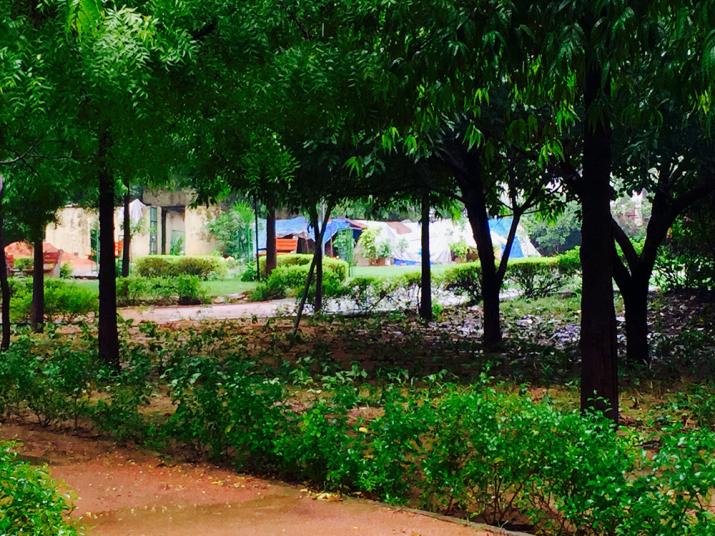
A cluster of tents tucked away in the corner of a park near our home
Published July 13, 2015, last updated on October 17, 2017 under Voices of DGHI
By Parth Chodavadia
I hardly ever get nightmares – maybe once or twice a year. That is why when I had a nightmare last week, I woke up in a sweat, confused, my heart pounding like the electronic music I love listening to.
I immediately touched my face, trying to sense if there was the wet coolness of a tear on my cheek. None. All I could feel was the rough bump of a mosquito bite I had suffered the night before. I looked around the room. My roommate was sound asleep. I could not understand how I had not woken him up. I had never cried as much as I had in that dream. I had never been that scared.
I fumbled through the dark bedroom looking for my glasses and my phone. Ever since I realized that I use my dreams and nightmares as a canvas to paint and analyze my conflicts, I have made the habit of writing them out. I opened Notes and began to recount my nightmare.
I remember sitting alone in a train car, looking out of the window to see massive sand dunes shape-shifting in the warm wind. A lavish five-course meal had been set out in front of me – a silver spoon in my left hand and a golden knife in the other – a train car fashioned for true royalty, ultimate luxury. But just as I was about to take a bite of my meal, I heard someone sobbing in the train car next door. Curious, I got up and walked to the glass barrier.
I was shocked. I was greeted with an overcrowded car – colorless – filled with children I have interacted with while in India, hungry and eyes brimming with disappointment for who I had become. I called out to them, hoping to get their attention. But my pleas were echoed with silence. No one even made the effort to turn his or her face to look in my direction. They could not see me or recognize me. I was a shadow without a silhouette – nonexistent, helpless, powerless.
It has been seven weeks since I first arrived to India, jet-lagged and anxious. Now we are almost done with our project and are preparing to go our separate ways. We have interviewed almost 100 children asking them about their relationships and trauma experiences and collected thousands of data points about their physical and mental health. From a strictly research objectives standpoint, I would call my summer a success.
Yet I still do not feel satisfied. Rather, I feel uncomfortable. A couple days ago, I interviewed someone that reminded me so much of myself – someone who people sought advice from and valued for his individuality, quiet, genuine, simple. I cannot help but think back to my nightmare from last week in which I was someone different, unrecognized by the children. I cannot help but think that I became a shadow, without a silhouette.
I strongly believe that reducing inequality is an important step to take to alleviate poverty. As a result, I keep a list of every inequality I see or witness. Audis and Mercedes driving next to tattered rickshaws, government welfare offices looking down upon clusters of colorful tents at its footsteps, lawyers in neatly pressed suits walking next to naked children who must bear the brunt of the pre-monsoon heat – these are just some. Inequality exists – it is a known fact, not an award-winning discovery.
But sometimes we become so bent on recognizing the inequalities around us that we forget about the inequalities we ourselves perpetuate in the communities we work with. Perhaps that’s why the children could not recognize me in my nightmare. Perhaps that’s why I found myself struggling to figure out who I had become when I interviewed that young man this past weekend.
Reflecting back upon the seven weeks I have spent in India, I have unknowingly contributed to the inequality I observed. I stuffed myself with exotic tofu shells and drank lemon cheesecake mocktails in fancy restaurants, shallowly debated whether my next pair of jeans should be Tommy Hilfiger or Louis Phillipe, and complained excessively about the heat even though I traveled in an air-conditioned Maruti Esteem. When I was not working on my project, I lived the life that South Delhi is famous for propagating – wealthy and elite.
Now you might argue that it is necessary to give in to indulgence once in a while. And I agree. After all, eating at restaurants, buying clothes at designer stores, and traveling in a car provides a source of income to someone – a waiter, a chef, a fashion designer, a driver. But I could also have chosen to directly eat from the man selling momos in the Chittaranjan Park Market, purchase clothes from family-owned businesses in Lajpat Nagar, or travel using auto-rickshaws – where I knew the money I spent directly went into their families’ pockets.
Instead I continued to feed large corporations the money that I am privileged to have. I do not know how much of that money actually trickled down to worker wages. What I know is that I chose to splurge in excess.
In my attempt to assimilate, in my attempt to discover, I don’t want to lose the one thing that has gotten me to where I am today – my simplicity and genuineness.
I recently interviewed someone my age and, in the process, I felt more and more guilty for my actions. He narrated to me how he was staying at the home longer than expected due to a medical reason and how he was unable to find employment as a result of his disability. When I asked him what he used his free time for, he told me that he found solace in the clicks of the Rubix Cubes he loved solving; the power to shift a chaotic cube into ordered colors endowed him with a control he has rarely had in life.
I sat there amazed, listening intently. He was content, calm – albeit a little worried – but patient throughout the conversation. All he wanted from life was to be independent, succeed in a world that classified him as a failure before he even had the chance to begin his career. He wanted to succeed as he was rather than become someone else. His genuineness served as a jarring reminder for why I was spending two months in a foreign country – so that I can learn from the orphaned and vulnerable people that I work with and imbibe their resilience into my daily life.
In the future, I hope to utilize my skills as a physician to help create bottom-up, community-led changes in healthcare governance. Yet I inevitably find myself consuming in a manner that is inconsistent with the lives I am trying to touch and with the people I am working with. This does not mean I have to be poor to work with the poor. I just need to do a better job bridging together the two worlds I am a part of – consume wisely but at the same time be generous.
That is easier said than done. Very few people are constantly thinking about these issues and even I find myself straying from what I have observed. In the span of the last fifteen minutes, I have surfed Amazon India to find a new shirt to wear to work next week while also looking up places to get the best samosas within a five minute walk from where I live. In a world where materialism and vanity take precedence, it is easy to get distracted.
But I have to begin somewhere and become more aware of what I do and how I do it. Hopefully by recognizing this, I can recognize myself and those that I am working with can recognize me – breaking the glass barrier between the train cars.


